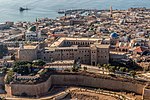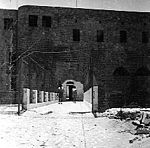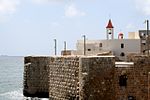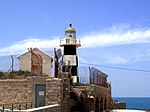Siege of Acre (1799)
1799 in France1799 in Ottoman Syria1799 in the Ottoman EmpireBattles of the French Revolutionary WarsConflicts in 1799 ... and 5 more
French campaign in Egypt and SyriaHistory of Acre, IsraelSieges involving FranceSieges involving the Ottoman EmpireSieges of the French Revolutionary Wars

The siege of Acre of 1799 was an unsuccessful French siege of the Ottoman city of Acre (now Akko in modern Israel) and was the turning point of Napoleon's invasion of Egypt and Syria, along with the Battle of the Nile. It was Napoleon's third tactical defeat in his career, after three years previously being defeated at the Second Battle of Bassano and the Battle of Caldiero during the Italy campaign. As a result of the failed siege, Napoleon Bonaparte retreated two months later and withdrew to Egypt.
Excerpt from the Wikipedia article Siege of Acre (1799) (License: CC BY-SA 3.0, Authors, Images).Siege of Acre (1799)
Marco Polo, Acre
Geographical coordinates (GPS) Address Nearby Places Show on map
Geographical coordinates (GPS)
| Latitude | Longitude |
|---|---|
| N 32.922 ° | E 35.07 ° |
Address
Marco Polo
2451308 Acre
North District, Israel
Open on Google Maps











